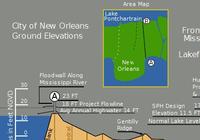-
Gov. Jerry Brown: only U.S. citizens on juries
In recent days, Governor Jerry Brown of California approved bills allowing driver’s permits to illegal immigrants and allowing illegal immigrants with a law degree to practice law in the state. Yesterday, however, he drew a tight line around jury service by vetoing a bill which would have made it possible for legal immigrants who are not citizens to serve on juries.
-
-
A state of disrepair: Thousands of U.S. aging bridges risk collapse
Of the 607,380 bridges listed in the recent U.S. National Bridge Inventory, 65,605 bridges are classified as “structurally deficient” and 20,808 as “fracture critical,” with 7,795 of those bridges designated as both structurally deficient and fracture critical. Experts say this indicates significant disrepair and a risk of collapse. These 7,795 structurally deficient, fracture critical bridges carry more than twenty-nine million drivers a day.
-
-
California granting driver's licenses to illegal aliens threatens homeland security: critics
Last Thursday night’s approval of AB 60 by both houses of the California Legislature, granting driver’s licenses to illegal aliens, poses a serious threat to the security of all Americans, critics charge. The critics say that in 2005, in response to recommendations by the 9/11 Commission, Congress enacted the REAL ID Act in order to discourage state governments from issuing driver’s licenses and other identity documents to illegal aliens – and that California’s AB 60 is designed to circumvent requirements of REAL ID Act.
-
-
Police’s facial recognition program becomes a political issue in Ohio
Attorney General Mike DeWine of Ohio confirmed last week that local and state law enforcement have used facial recognition software since June of this year to match images of potential suspects and victims to pictures on the state’s drivers’ licenses and mug shots. The Democratic challenger for the Attorney General post faulted DeWine’s office for launching the program on 6 June without any public notice.
-
-
Jersey shore towns build protection against future storms

Mantoloking and Brick townships in New Jersey were among the hardest hit by Superstorm Sandy. The storm also destroyed the natural dune barriers which offered a measure of protection. The two cities have decided to take action to minimize the damage of inflicted by a future storm: a $40 million project will see a steel wall —extending sixteen feet above the beach with a depth of thirty-two feet below the ground, and covered in sand to form an artificial dune — will run along the length of the two towns.
-
-
New levee system offers New Orleans better protection

With the busiest period of the 2013 hurricane season approaching metro New Orleans, the area is ready to face the challenge with a flood control system worth about $14.5 billion. The network of levees, floodwalls, and pumps, its designers say, should nearly eliminate the risk of flooding from most hurricanes, and substantially reduces flooding from hurricanes the size of 2005 Hurricane Katrina.
-
-
La. flood protection agency sues 97 energy companies for wetland destruction
A Louisiana state agency on Wednesday filed a lawsuit against ninety-seven energy companies, charging that the companies have inflicted severe damage on fragile coastal wetlands, damage which left New Orleans and other Louisiana cities more vulnerable to hurricanes and storm surges. The agency wants the court to order these companies to pay steep penalties which would help the state restore the wetlands and thus recreate the natural buffer which had protected New Orleans.
-
-
Bloomberg vetoes bills aiming to curb NYPD’s stop-and-frisk
New York City mayor Michael Bloomberg vetoed two bills aiming to limit the NYPD’s stop and frisk policy. The policy has been criticized by civil rights advocates, and has also been highlighted by those opposing Police Commissioner Ray Kelly’s candidacy to replace Janet Napolitano as DHS secretary.
-
-
State Department approves U.S.-Canada pipeline, but it is not Keystone
The State Department has approved a U.S.-Canada pipeline, but it is not the Keystone XL project which is still being debated. The Vantage Pipeline will carry ethane from North Dakota through Saskatchewan into Empress, Alberta.
-
-
FAA warns Colorado town about drone hunting

The town of Deer Trail, Colorado is considering the idea of allowing town residents to purchase hunting permits to shoot down drones operated by the government. The proposed permit would cost $25, and residents would be entitled to a $100 reward from the city for a successful attempt to shoot down a drone, if the drone’s “markings and configuration are consistent with those used on any similar craft known to be owned or operated by the United States federal government.”
-
-
Idaho joins program connecting DMV information to E-Verify
Idaho became the third state to join the Records and Information from DMV’s for E-Verify (RIDE) program on Sunday. The other two states are Mississippi and Florida. RIDE automates motor vehicle document verification between Motor Vehicle Agencies (MVAs) and the United States Citizenship and Immigration Services (USCIS).
-
-
DHS raises Phoenix’s terror-risk ranking
DHS has raised Phoenix’s terrorist risk assessment three spots, from number eighteen to number fifteen. The change will entitle the city to $5.5 million in a federal security grant, $1.5 million more than it received from the same grant last year.
-
-
Improving the reliability, resiliency of post-Sandy N.J. electric grid
According to NOAA, prolonged electrical outages, largely because of storms, have been steadily increasing in frequency since 1995. Sandia Lab will help East Coast communities devastated by Hurricane Sandy boost the resiliency of their electric grids, so they can be better prepared to deal with natural disasters in the future.
-
-
FAA investigating use of Michigan state-owned planes
The Federal Aviation Administration(FAA)is looking into the State of Michigan’s practice of leasing its passenger planes to athletic officials at Michigan State University(MSU).
-
-
FEMA demands that Erie County, N.Y. return millions in disaster relief
The Federal Emergency Management Agency (FEMA) will hold off on deciding whether to collect millions of dollars given to Erie County, New York in the aftermath of the October Surprise storm of 2006. The record-shattering storm caused widespread damage in Buffalo, and FEMA gave Erie country millions of dollars in disaster relief. Departmental audit has found that country officials did not use the money properly, and FEMA wants $48 million of it back.
-
More headlines
The long view
Smaller Nuclear Reactors Spark Renewed Interest in a Once-Shunned Energy Source
In the past two years, half the states have taken action to promote nuclear power, from creating nuclear task forces to integrating nuclear into long-term energy plans.
